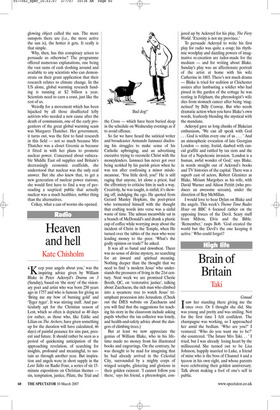Heaven and hell
Kate Chisholm
‘Keep your angels about you,’ was the inspiring advice given by William Blake in Peter Ackroyd’s Drama on 3 (Sunday), based on ‘the story’ of the visionary poet and artist who was born 250 years ago in 1757 and who is famous for giving us ‘Bring me my bow of burning gold’ and ‘Tyger tyger’. It was stirring stuff. And particularly apt for the Christian season of Lent, which so often is depicted as 40 days (or rather, as those who, like Eddie and Lilian on The Archers, have given something up for the duration will have calculated, 46 days) of painful penance for sins past, present and future. It should rather be seen as a period of quickening anticipation of the approaching revelation, of searching for insights, profound and meaningful, to sustain us through another year. But inspiration and angels were in short supply in the Lent Talks on Radio Four, a series of six 15minute expositions on Christian themes sin, temptation, justice, Pilate, the Trial and the Cross — which have been buried deep in the schedule on Wednesday evenings as if to avoid offence.
So far we have heard the satirical writer and broadcaster Armando Iannucci disclosing his struggles to make sense of his Catholic upbringing, and an advertising executive trying to reconcile Christ with the moneylenders. Iannucci has never got over being scolded by his parish priest when he was ten after confessing a minor misdemeanour, ‘You little devil, you!’ He is still raging that anyone, let alone a priest, had the effrontery to criticise him in such a way. Creativity, he was taught, is sinful; it’s showing off, indulging the ego. He quoted from Gerard Manley Hopkins, the poet-priest who tormented himself with the thought that crafting words into verse was a sinful waste of time. The adman meanwhile sat in a branch of McDonald’s and drank a plastic cup of coffee while worrying away about the incident of Christ in the Temple, when He turned over the tables of the men who were lending money to the poor. ‘What’s the godly opinion on trade?’ he asked.
It was all so banal and downbeat. There was no sense of divine mystery, no searching for an inward and spiritual meaning. Nothing deeper than the thought that we need to find ‘a modern Jesus’ who understands the pressures of living in the 21st century. Next week we are promised Cherie Booth, QC, on ‘restorative justice’, talking about Zacchaeus, the rich man who climbed into a sycamore tree to watch Jesus’ triumphant procession into Jerusalem. (Check out the DfES website on Zacchaeus and you will find that the suggestions for teaching his story in the classroom include asking pupils whether the tax collector was lonely, and health-and-safety advice about the dangers of climbing trees.) But at least we now appreciate the genius of William Blake, who in his lifetime made no money from his illustrated books and engravings. On the contrary, he was thought to be mad for imagining that he had already arrived in the Celestial City, surrounded by a mighty corps of winged seraphs, glistering and glorious in their golden raiment. ‘I cannot follow you there,’ says his friend, a phrenologist, con jured up by Ackroyd for his play, The Fiery World. ‘Eternity is not my province.’ To persuade Ackroyd to write his first play for radio was quite a coup; his rhythmic wordplay and dazzling powers of imaginative re-creation are tailor-made for the medium — and for writing about Blake. Sunday’s play was an affectionate portrait of the artist at home with his wife Catherine in 1803. There’s not much drama — Blake is tried for sedition at Chichester assizes after lambasting a soldier who had pissed in the garden of the cottage he was renting in Felpham; the phrenologist’s wife dies from stomach cancer after being ‘magnetised’ by Billy Cosway. But who needs dramatic action when you have Blake’s own words, fearlessly blending the mystical with the mundane.
Ackroyd gave us long chunks of Blakeian enthusiasm, ‘We can all speak with God ... God is within every one of us . . . ’ And an atmospheric evocation of late Georgian London — noisy, foetid, daubed with rancid graffiti and rattled by tax riots and the fear of a Napoleonic invasion. ‘London is a human, awful wonder of God,’ says Blake, in words straight out of Ackroyd’s books and TV histories of the capital. There was a superb cast of actors, Robert Glenister as Blake, Miriam Margolyes as his wife, with David Warner and Alison Pettitt (who produces an awesome scream), under the direction of Roy McMillan.
I would love to hear Dylan on Blake and the angels. This week’s Theme Time Radio Hour on BBC 6 focused rather on the opposing forces of the Devil. Scary stuff from Milton, Elvis and the Bible. ‘Remember,’ rasps Bob. ‘God created the world but the Devil’s the one keeping it active.’ Who could forget?


























































































 Previous page
Previous page